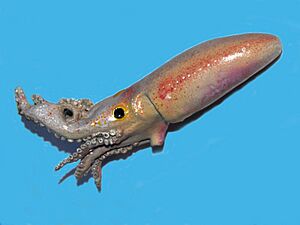Carol bobtail squid facts for kids
Quick facts for kids Carol bobtail squid |
|
|---|---|
 |
|
| Museum model of Neorossia caroli | |
| Conservation status | |
| Scientific classification | |
| Synonyms | |
|
Neorossia caroli, also known as the Carol bobtail squid, is a small type of bobtail squid. It belongs to a family of squids called Sepiolidae. These interesting creatures live in the ocean and are known for their unique way of life.
Contents
What's in a Name?
The name caroli comes from "Carolus," which is the Latin way of saying "Carlos." This squid was named to honor King Carlos of Portugal.
Types of Carol Bobtail Squid
Scientists have found a few different types of this squid. These are called subspecies:
- N. c. jeannae (found in the southwest Atlantic Ocean)
- N. c. caroli (found in the northeast, east, and southeast Atlantic Ocean)
Where Do They Live?
The Carol bobtail squid lives in many parts of the Atlantic Ocean. You can find them from places like Iceland and the United Kingdom all the way down to Namibia in Africa. They also live near the Falkland Islands. These squids are also found in the Mediterranean Sea and the Black Sea.
They are bottom-dwellers, meaning they live on the ocean floor. They prefer areas with muddy ground. You can find them at depths from about 40 meters (130 feet) down to over 1,700 meters (5,700 feet).
What Do They Look Like?
The Carol bobtail squid has a soft, fleshy body. Males can grow up to about 51 millimeters (2 inches) long. Females are usually larger, reaching up to 83 millimeters (3.3 inches) long. Their body is wide and oval-shaped. The top part of their body, called the mantle, is not attached to their head.
They have arms with two rows of suckers on each. Unlike some other squids, their ink sac does not work. This means they cannot release ink to escape from danger.
Life Cycle and Habits
These squids are mostly active at night. During the day, they usually bury themselves in the muddy ocean floor. They come out at night to find food.
When it's time to reproduce, the male squid uses a special arm. This arm is designed to hold and transfer tiny packets of sperm to the female. The female then lays her eggs throughout the year. The eggs are a pretty violet color and are quite large. She attaches them to hard surfaces on the ocean floor. After laying and caring for their eggs, both the male and female squids usually die.


